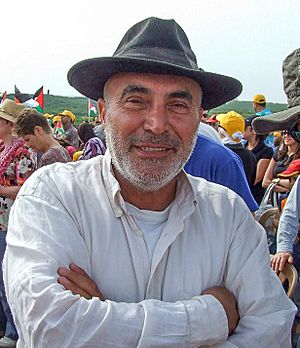Ezra Nawi facts for kids
Ezra Yitzhak Nawi (Hebrew: עזרא יצחק נאווי; 1951 – 9 January 2021) was an Israeli human rights activist. He was known for his work helping Bedouin herders and farmers in the South Hebron Hills. He worked to protect their homes and land from being taken over.
Nawi became well-known when he faced legal issues related to his efforts to stop homes from being torn down in the West Bank. Many people around the world protested in support of him. In 2008, a film called "Citizen Nawi" was made about his life and work.
Who Was Ezra Nawi?
Ezra Nawi was born in Jerusalem. His family was Mizrahi Jewish, originally from Basra, Iraq. They had moved to Israel from Kurdistan just before he was born.
He was raised by his grandmother, who spoke to him in Iraqi Arabic. As a teenager, he lived near Reuven Kaminer, a leader in Israel's Communist Party. Nawi later said that Kaminer influenced his desire to help others.
Nawi served in the Israeli army in a combat engineering unit. After the 1973 Yom Kippur War, he traveled to the US and Europe. Ezra Nawi passed away on January 9, 2021, in Jerusalem at the age of 69.
Ezra Nawi's Work for Human Rights
Ezra Nawi joined a group called Ta'ayush, which works for human rights for both Jewish and Arab people. Because he spoke both Hebrew and Arabic fluently, he was able to connect Israeli activists with local Palestinians in the Hebron area.
People who knew him said he had a natural understanding of how to work with Palestinians. He used money he earned from his plumbing job to support his activism. He was known for charging a lot for his plumbing services so he could donate more to the farmers.
Nawi believed his work was about "decency," not just politics. He was seen as a guide and mentor by many young activists in the West Bank.
He felt a strong connection to the Bedouin herders and farmers. He said, "I was attached to this community from the moment I came in contact with it, living like people in biblical times, working the land with the most primitive tools." He felt he had to help them when their way of life was in danger.
Nawi and his group of activists acted like an "independent aid agency." They used any money they received to help the poorest people. For many years, he organized summer camps for Bedouin children. He brought projectors to show them films and took them on trips to Jericho, where they could swim for the first time.
He also helped bring technology to these communities. He installed solar panels and windmills to generate electricity. He helped ambulances get through roadblocks and gave money to people in need. He also organized activities with Ta'ayush to help protect children going to school from settlers.
Films About Ezra Nawi
Ezra Nawi's story has been shared in two documentary films:
- In 2005, a Canadian-Jewish filmmaker named Elle Flanders made a documentary called Zero Degree of Separation.
- In 2007, another film about Nawi's life and work, "Citizen Nawi" (HaEzrach Nawi), was directed by Nissim Mossek. This film showed the challenges faced by the Bedouin people and the difficulties of Israeli-Palestinian relations.
The director of "Citizen Nawi" aimed to show the real challenges of working towards peace.
See also
 In Spanish: Ezra Nawi para niños
In Spanish: Ezra Nawi para niños
- List of peace activists


